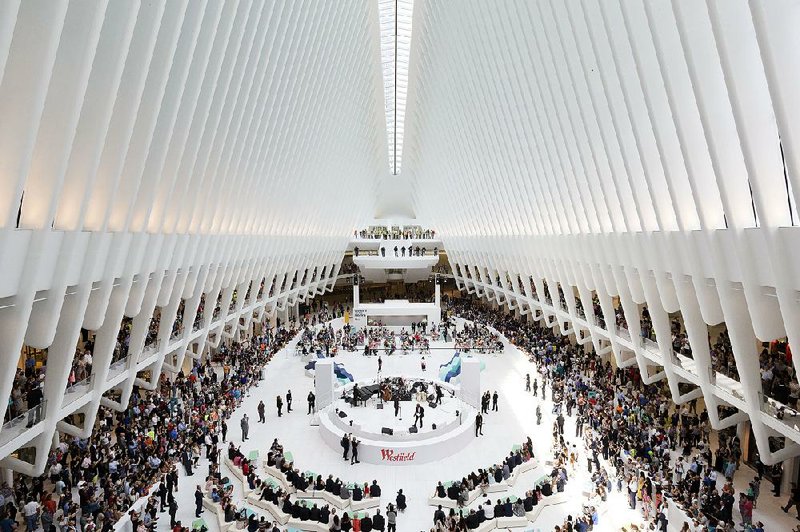NEW YORK -- The re-opening of the World Trade Center mall Tuesday, is expected to help transform downtown Manhattan shopping and illustrate how much progress has been made in rebuilding and revitalizing the area since the 9/11 attacks.
Shops from Apple to Forever 21 to H&M to John Varvatos will serve an increasingly diverse group of area residents and workers beyond Wall Street bankers that now includes a slew of advertising and media employees. But they'll also be catering to tourists who come to visit the National September 11 Memorial & Museum, which requires a delicate touch.
The new spaces let customers tap into technology, as some retailers use the space for their latest ideas. Ford Motor Co. is set to open this fall the first FordHub, a showroom for innovations that's not a dealership. Shoe purveyor Aldo Group Inc. is using the opening to introduce an app feature for this store, which will be rolled out to other stores. Digital billboards in the mall include a 280-foot-long one.
"We truly believe this will be the center of commerce and culture for lower Manhattan," said Bill Hecht, chief operating officer of Westfield Corp.'s U.S. division. Westfield manages the retail properties, while the Port Authority of New York and New Jersey owns the real estate.
Hecht describes the location as a "symbol of hope, opportunity, progress and perseverance."
The 365,000-square-foot center will have more than 100 stores, with about 60 opening Tuesday and the rest in time for Christmas shopping. Food options include Eataly's second Manhattan location, which features foods from Italy and coffee and gelato bars.
It stretches along a four-block underground network that spans the bases of three office towers. While mostly below street level, light beams in through the windows of the winged Oculus, designed by Santiago Calatrava, that top the transportation hub of 13 subway trains and river ferries. More than 300,000 commuters use it on a daily basis.
"When you look at how many people now live in the neighborhood, how many commuters work in the neighborhood and how many tourists now are coming to the memorial, emotionally it was a no-brainer and financially it was a no-brainer," Angela Ahrendts, Apple's retailing chief, said at the store's opening Tuesday.
Westfield says 15 million travelers are expected to visit the areas from the U.S. and around the world next year to see the memorial and nearby places of interest.
"We have huge respect for this site," Hecht said. There are no signs on the side of the mall that faces the 9/11 memorial. Every year on the anniversary of the attacks, the skylight of the Oculus -- meant to symbolize the image of a dove released from a child's hand -- will open to bring a slice of the open New York sky into the building.
Westfield said ensuring safety and security at the mall is the highest priority for it and the Port Authority. Uniformed police and private security will be present at the mall, Port Authority spokesman Joe Pentangelo said, but declined to give specifics about any other measures.
"As with any high-profile public location and transit center, there are extensive security measures that have been put in place with law enforcement and others," Westfield said.
More than 60,000 residents live within blocks of the World Trade Center area, about three times the number from right before 9/11. The former shopping mall in the World Trade Center was one of the most successful properties in the world, but catered to daytime weekday shopping, said Robin Abrams, vice chairman of The Lansco Corp., a real estate advisory firm. The new mall is expected to have a vibrant night and weekend atmosphere, and Hecht noted a deliberate move to include shops with necessities like drugstore Duane Reade.
Real estate experts believe the mall will complement the nearby Brookfield Place, which opened in 2015 and features high-end Gucci and Hermes shops. It will also be different from the Seaport Mall, which is being reopened next year and is focusing on catering to locals. In addition to retail, a Beekman Hotel and Four Seasons Hotel as well as a performing arts center are coming, part of the $30 billion poured into the downtown area from public and private investment since 9/11.
The lower downtown area has about $6.5 billion in annual buying potential, said Jessica Lappin, head of the Downtown Alliance, which manages the downtown-lower Manhattan business improvement district. Hecht expects the mall will eventually generate about $1 billion in retail sales annually, making it one of the most productive of the company's sites.
Smythson of Bond Street, a British maker of luxury stationery and leather goods, has a store in midtown Manhattan but is "really excited to be downtown," said Ruby Victor, the head of marketing. Given all the foot traffic, she hopes being there will raise awareness of the company.
"We're still a niche brand," she said.
The new malls plus the developments to come are a lot of new retail for the area to absorb. But New York real estate experts believe residents have been eager for more shopping and restaurants.
"Our sense is that there has been demand for a long time that wasn't met," said Lappin. "There may be some bumps along the way. This is an area that needs places to shop and eat."
Business on 08/17/2016
